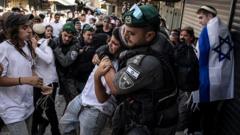Crowds of far-right Israelis gathered on Jerusalem Day to participate in a march that spiraled into violence against Palestinians, with chants of "death to Arabs" echoing in the streets. This annual event commemorates the taking of East Jerusalem during the 1967 Arab-Israeli war, but has increasingly become a focal point for nationalistic fervor and racial hostility.
The event, attended by thousands, saw marchers invade Palestinian neighborhoods in the old city, leading to confrontations where activists harassed local Arab traders. Eyewitness reports detailed a hostile atmosphere, with slogans such as "Your home will be ours" ringing in the ears of those caught in the uproar. Opposition Leader Yair Lapid denounced the gathering as a "festival of hatred and racism," signaling a widespread concern about the implications of such displays for social cohesion.
Israeli police were mobilized to control the situation, detaining several aggressive participants. National Security Minister Itamar Ben Gvir, speaking to the crowd, called for the imposition of the death penalty on "terrorists," a provocative statement that drew criticism from Palestinian leadership. Nabil Abu Rudeineh, a spokesman for the Palestinian presidency, condemned not just the violence of the march but also Ben Gvir’s visit to the Al-Aqsa mosque compound—a site that holds significant religious importance for both Muslims and Jews.
During a cabinet meeting, Prime Minister Benjamin Netanyahu reaffirmed his commitment to maintaining Jerusalem under Israeli sovereignty. The annual parade culminates at the Western Wall, a site of immense significance for the Jewish community, and often highlights the contentious dynamics surrounding East Jerusalem, which Palestinians claim as their future capital.
The backdrop of this year's events is the ongoing war in Gaza, initiated after a surprise attack by Hamas in October 2023, resulting in heavy casualties on both sides. Reports suggest that at least 53,939 people, among them a significant number of children, have lost their lives in Gaza since the conflict escalated.
With tensions running high, leaders across the political spectrum in Israel have denounced the violence, with Left-wing opposition leader Yair Golan describing the events as emblematic of the "hatred, racism and bullying" that threatens a unified and peaceful Jerusalem for people of all faiths. The ongoing conflict underlines the fragility of the socio-political landscape, prompting calls for a future where Jerusalem can be renewed as a shared city for Jews, Christians, and Muslims alike.




















